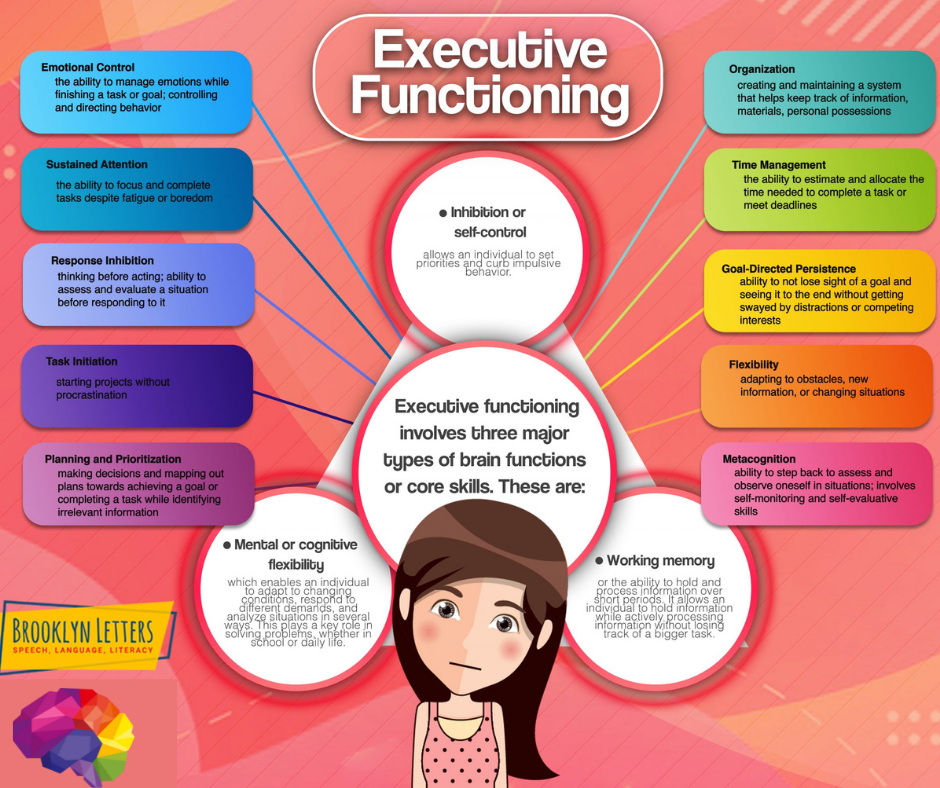When executive functioning skills are hindered, it can make learning, working and managing daily life difficult. Things like organization, planning, and the ability to think things through and weigh the pros and cons of a situation can be a real struggle that impacts life at home, work life, personal relationships — everyday life. This is because executive functions, which are controlled by an area in the frontal lobe of the brain, has to do with the neurologically-based skills that involve mental control and regulate behavior.
My daughter has battled Executive Function Disorder all of her life, but right now, it is really preventing her from moving forward with her life. Things like completing a task, making decisions, time management, and projecting ahead are SO HARD. Is there anything that can help my adult daughter struggling with executive functioning disorder? ~ thetoolbox.com
Normally, people have a strong inclination — feelings — of intentional or voluntary control of their behavior (Posner and DiGirolamo, University of Oregon). When the executive functioning skills are intact, such abilities are possible:
- Organizing one’s environment or schedule
- Being able to mentally evaluate the pros of different problem-solving strategies
- Choosing actions based on best possible outcomes
- Time management and effort needed to achieve outcome
- Initiating tasks necessary to carry out decisions
- Regulating behavior
- Focusing on relevant sights, sounds, and physical sensory information
- Planning for the future

Between 1980 and 1986, psychologists Donald Norman and Tim Shallice proposed a framework of executive functioning that listed the five types of situations in which routine activation of behavior would not be sufficient for optimal performance, hence where executive functions must kick in:
The Norman-Shallice Model includes:
- Situations that involve planning or decision making
- Situations that involve error correction or trouble shooting
- Situations where responses are not well-rehearsed or contain novel sequences of actions
- Dangerous or technically difficult situations
- Situations that require overcoming strong habitual response or resisting temptation
Executive Dysfunction
Disordered executive function can impair a person’s ability, making daily life almost unmanageable, often resulting in an individual feeling despaired. Behavioral outcomes can lead to frustration, procrastination, and negative self-talk surrounding inferiority and failure.
Some signs to watch out for:
- Restlessness
- Lack of impulse control
- Being late to social activities, meetings, appointments, school, or work
- Losing possessions
- Outbursts/anger mood swings
- Struggles with goal-setting
- Has difficulty staying focused and requires man reminders or prompts to stay on task
- Has trouble knowing where to start in the related-task and often procrastinates
- Not able to fully comprehend how much time a task or project will take to complete it
- Experiences difficulty in focusing on details and can’t grasp the overall-picture of the task in-hand.
- Takes longer than others to finish tasks
- Struggles with problem checking and assessing their own work
- Finds it challenging to follow multi-step directions
Executive Function and Mental Health
It’s not uncommon to find executive function and mental health intertwined. Some individuals may be coping with depression, anxiety, or phobias, brought on or exacerbated by executive dysfunction. People who have been diagnosed with ADHD and ADD, dysgraphia, dyslexia or have trouble with other processing skills, can also be struggling with an executive dysfunction.
However, those are not the only conditions that can affect executive function.

Executive Function Disorder Can Be Linked to Certain Conditions:
People with executive function issues may have…
- Autism Spectrum Disorder (ASD)
- ADHD
- Anxiety
- Depression
- Bipolar disorder
- Schizophrenia
- Obsessive-compulsive disorder (OCD)
- Autism
- Traumatic brain Injuries
- Chronic Pain
- Alzheimer’s disease, dementia, Lewy body dementia
- Tourette syndrome
- Learning Disabilities
- Cognitive Disorders
The Good News
Boosting executive functioning skills is attainable and can be taught and learned. Today, there are many children, young adults, adults, and seniors, who work with a behavioral therapist, a cognitive behavioral therapist (CBT), or an executive function coach to help improve their daily living skillset. Certain medications can also benefit the adaptive learning process.
Executive Function Coaching
What is Executive Function Coaching? It is a therapeutic intervention persée, in which it helps people learn and develop strategies to help improve their focus-retention, organization and planning of activities (and adhering to a set calendar or schedule), regulating their emotions, and analyzing and changing their approaches.
Accountability/Executive Function Coaching Example:
Connections in Recovery Coaches work with executive functioning on a broad spectrum. This includes working with adolescents, adults and seniors with learning difficulties and life skills, such as mental skills, adaptable/flexible thinking, memory, planning, time management, organization, self-care/hygiene, fitness, nutrition, budgeting, academic support, job/career support, managing anxiety, navigating social situations, interpersonal relationships, self-regulation and more. Each individual is carefully matched to an Executive Function Coach that matches his or her needs.
If you, a relative or a loved one is struggling with executive function, Connections in Recovery can guide you towards a healthier and more fulfilling life. Visit us at www.ConnectionsinRecovery.com or call (888) 617-1050 to find out how we can help.


